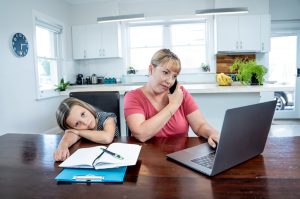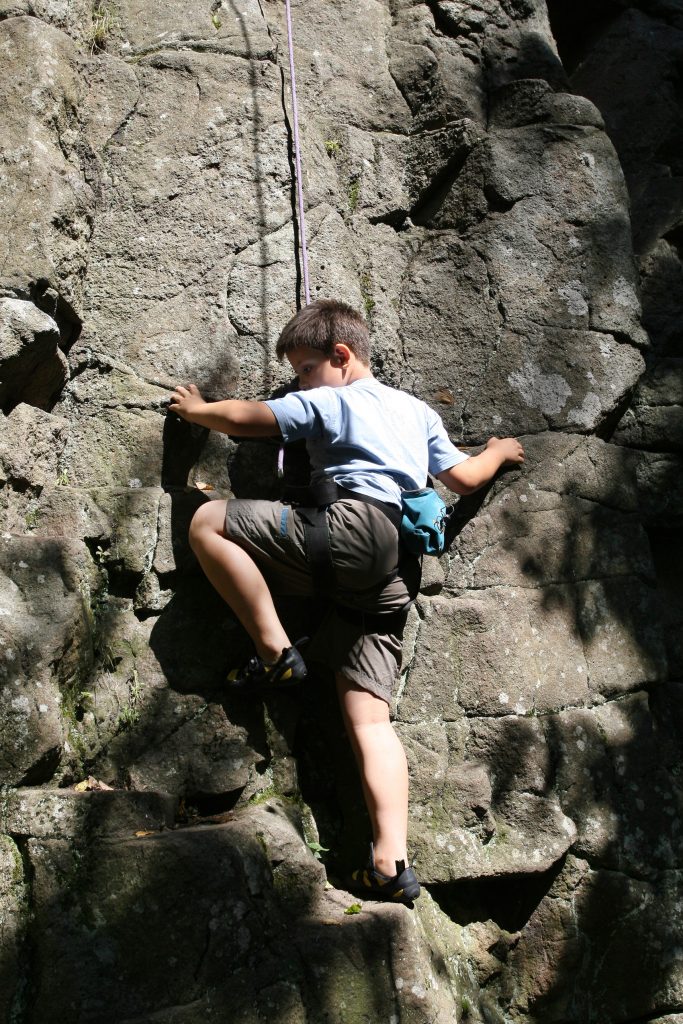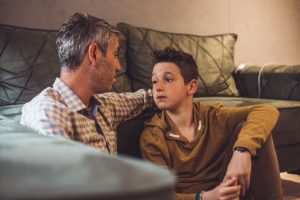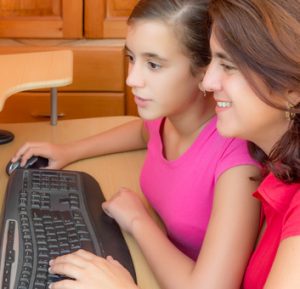 Do you notice that your son or daughter is feeling more frustrated, down and hopeless as the shelter-in-place directive and online schooling continues? I’m hearing from so many kids and parents that things seem to be getting worse as this confinement continues. With thousands of schools switching their grading systems to Pass/Fail, many kids are doing the minimal amount of homework to get by if not avoiding it altogether. Some may not be showering daily, brushing their teeth or putting on clean clothes. Others have reverted to younger and less mature coping skills, erupting and arguing more while cooperating less than they typically do. What can you do to combat their numbness, hopelessness or regressive behaviors?
Do you notice that your son or daughter is feeling more frustrated, down and hopeless as the shelter-in-place directive and online schooling continues? I’m hearing from so many kids and parents that things seem to be getting worse as this confinement continues. With thousands of schools switching their grading systems to Pass/Fail, many kids are doing the minimal amount of homework to get by if not avoiding it altogether. Some may not be showering daily, brushing their teeth or putting on clean clothes. Others have reverted to younger and less mature coping skills, erupting and arguing more while cooperating less than they typically do. What can you do to combat their numbness, hopelessness or regressive behaviors?
The first step is acknowledging their very real losses and emotional pain. Nothing is familiar any more.  They’ve had to let go of daily casual peer contact at school, planned social get-togethers, familiarity of learning environments and teacher interactions–the list goes on and on. Without having things to look forward to, they may get enraged or turn inward and shut down or both. This is especially true for kids who’ve had special events like graduation, sports seasons, dance recitals, drama performances and more snatched away from them without warning. You may well be experiencing pushback, non-cooperation and aggression in your family that you haven’t that you thought you’d moved beyond or is completely new. Let’s review common struggles for families and look at some useful tools for dealing with them more effectively:
They’ve had to let go of daily casual peer contact at school, planned social get-togethers, familiarity of learning environments and teacher interactions–the list goes on and on. Without having things to look forward to, they may get enraged or turn inward and shut down or both. This is especially true for kids who’ve had special events like graduation, sports seasons, dance recitals, drama performances and more snatched away from them without warning. You may well be experiencing pushback, non-cooperation and aggression in your family that you haven’t that you thought you’d moved beyond or is completely new. Let’s review common struggles for families and look at some useful tools for dealing with them more effectively:
- When kids are stressed, anxious and vulnerable, they will act out their concerns with you. A ten year-old boy shared his fear and confusion about living with COVID: “We don’t know when and if this is ever going to stop and if we’ll have our lives the way we want it. . .No matter how much you try not to think about it, you’re still going to focus on it. Like school and stuff but even going on a walk to refresh your brain, you have to wear a mask.” He’s been arguing vociferously with his parents or running to his room, slamming the door and angrily crying more days than not. He doesn’t know how to wrap his brain around what’s going on. Sound familiar?
When kids act out towards their parents, they are showing us with their words and behavior that their emotions have overwhelmed their internal resources to cope. While it’s not pleasant, it is actually a positive thing in one important way. It shows you that they feel both connected and safe enough with you to share feelings that they can neither understand nor manage on their own. Whatever coping mechanisms you’ve helped them develop probably have weakened in the past month or two. Many kids with ADHD (and those without it too) are taking a few big steps backwards based on intense frustration, anxiety and disappointment. This kind of regression is normal during stressful situations. Nonetheless, you shouldn’t tolerate disrespectful, hurtful or inappropriate actions because of their struggles.  Tip: Expect their pushback, notice when it occurs and plan for how to deal with it in advance. Avoid crises by planning and predicting issues that seem to trigger distress. Talk to your son or daughter, share your observations about their struggle and put a plan in place to calm things down when they occur. Create a timed break, a short regrouping to discuss how to move forward and then take that action: Use ‘Stop, Think, Act.’ 2. Support their need for social connection by figuring out ways to contact and engage peers remotely and/or safely in person. Kids have to be able to experience themselves in relation to their friends to nurture their identity and make sense of the world. All of those casual “Hellos” and “How are you doing?” that occur while passing in school hallways, at lunch tables and on the playground contribute to how they see themselves and who they want to become. We have to assist them to reach out and stay in touch which often means you’ll be responsible for helping or supporting them to facilitate these activities. Tip: Try some of these ideas: Zoom sessions for Lego, drawing or games (Monopoly, Clue, Taboo, etc); chalk drawing outside (mark off sections that are 6 feet apart, put on their masks and watch them); tossing a frisbee or baseball with gloves and masks; share a baking project on FaceTime; bike riding with a friend who also has a mask on; group Zoom dinners, playing music or watching a show via screen share; creating videos with individual characters that are assembled by one or two kids. Anything that’s outside the box but still follows safety guidelines.
Tip: Expect their pushback, notice when it occurs and plan for how to deal with it in advance. Avoid crises by planning and predicting issues that seem to trigger distress. Talk to your son or daughter, share your observations about their struggle and put a plan in place to calm things down when they occur. Create a timed break, a short regrouping to discuss how to move forward and then take that action: Use ‘Stop, Think, Act.’ 2. Support their need for social connection by figuring out ways to contact and engage peers remotely and/or safely in person. Kids have to be able to experience themselves in relation to their friends to nurture their identity and make sense of the world. All of those casual “Hellos” and “How are you doing?” that occur while passing in school hallways, at lunch tables and on the playground contribute to how they see themselves and who they want to become. We have to assist them to reach out and stay in touch which often means you’ll be responsible for helping or supporting them to facilitate these activities. Tip: Try some of these ideas: Zoom sessions for Lego, drawing or games (Monopoly, Clue, Taboo, etc); chalk drawing outside (mark off sections that are 6 feet apart, put on their masks and watch them); tossing a frisbee or baseball with gloves and masks; share a baking project on FaceTime; bike riding with a friend who also has a mask on; group Zoom dinners, playing music or watching a show via screen share; creating videos with individual characters that are assembled by one or two kids. Anything that’s outside the box but still follows safety guidelines.  3. Families are tired of being together and everybody’s nerves are fraying. Neither you nor your child or teen can sometimes get adequate or enough space from each other. A thirteen year-old girl told me “Frankly, I’m sick and tired of them [her parents]. It’s been repetitive for weeks. I’d go anywhere as long as it’s not with them.” Your kids love you and you them but 24/7 is A LOT OF FAMILY TIME. Everyone needs SOME time apart that isn’t instigated by arguments, tears or blame. Tip: Plan for quiet, alone time each day. Set a specific, timed period in your day for down time. This may or may not include screen time–that’s up to you. It’s best to talk together as family beforehand and list options for each person that make the most sense for them. You can all choose the same option daily or have rotating activities. Do whatever works best.
3. Families are tired of being together and everybody’s nerves are fraying. Neither you nor your child or teen can sometimes get adequate or enough space from each other. A thirteen year-old girl told me “Frankly, I’m sick and tired of them [her parents]. It’s been repetitive for weeks. I’d go anywhere as long as it’s not with them.” Your kids love you and you them but 24/7 is A LOT OF FAMILY TIME. Everyone needs SOME time apart that isn’t instigated by arguments, tears or blame. Tip: Plan for quiet, alone time each day. Set a specific, timed period in your day for down time. This may or may not include screen time–that’s up to you. It’s best to talk together as family beforehand and list options for each person that make the most sense for them. You can all choose the same option daily or have rotating activities. Do whatever works best.  4. Things feel incredibly monotonous right now. When kids with ADHD and their Now/Not now brains look into an unknown future where things have already been canceled for this school year and summer activities are following suit, it’s very discouraging. Life can seem hopeless and they feel powerless and discouraged. You may well feel like this too. Tip; Think one to two weeks at a time. We really don’t know what will happen next month so let’s try not to focus on the unforeseeable future. Instead, create some simple things to look forward to now. Make specific plans for special, fun things like take-out from a favorite restaurant, home-made sundaes on a Thursday night, breakfast for dinner. Talk with your kids about some of their ideas to mix it up and then include their suggestions.
4. Things feel incredibly monotonous right now. When kids with ADHD and their Now/Not now brains look into an unknown future where things have already been canceled for this school year and summer activities are following suit, it’s very discouraging. Life can seem hopeless and they feel powerless and discouraged. You may well feel like this too. Tip; Think one to two weeks at a time. We really don’t know what will happen next month so let’s try not to focus on the unforeseeable future. Instead, create some simple things to look forward to now. Make specific plans for special, fun things like take-out from a favorite restaurant, home-made sundaes on a Thursday night, breakfast for dinner. Talk with your kids about some of their ideas to mix it up and then include their suggestions. 

 Q: What is situational anxiety? A: Situational anxiety occurs when someone is worried about certain environments or events and what will happen in these contexts. When people suffer from situational anxiety, they feel frightened by and unclear about how to manage the circumstances that concern them. Sometimes they may exaggerate perceived negative outcomes as well. Q: What are some of the most common fears, anxious thoughts individuals are having in response
Q: What is situational anxiety? A: Situational anxiety occurs when someone is worried about certain environments or events and what will happen in these contexts. When people suffer from situational anxiety, they feel frightened by and unclear about how to manage the circumstances that concern them. Sometimes they may exaggerate perceived negative outcomes as well. Q: What are some of the most common fears, anxious thoughts individuals are having in response This new “normal” isn’t anything we’re accustomed to. With school closures, social distancing, working from home, job lay-offs and 24/7 family time, everybody is making huge adjustments to the massive disruption wrought by COVID-19. While we adults struggle to wrap our brains around these changes, it’s even harder for children and teens who may or may not understand why they are home. Managing uncertainty with your family during COVID-19 will likely be a continuous process for quite some time. Take time to get familiar with anxiety-reducing practices, and make a habit of family check-ins so you all can feel the support from one another during this difficult experience. Kids and teens are now separated from friends, family and familiar activities like school, sports, music, drama, etc. They feel ripped off and, frankly, lack a sense of control about their lives. And then there’s the worry. Daily news reports increase our anxiety. We’re concerned for our loved ones while simultaneously feeling helpless to protect them and ourselves. Many of us are living more anxiety than we are accustomed to and it’s not a particularly pretty picture. And yet, human beings have built-in hope and fortitude. We have all been through challenging times in our lives (perhaps not to this extent) and survived. I’m convinced we will survive this too–although the timeline may take longer than any of us anticipated. How can we apply our resilience from the past struggles to help us in this moment? How can we assist our family in managing their uncertainty along with their disappointment, frustration and loneliness?
This new “normal” isn’t anything we’re accustomed to. With school closures, social distancing, working from home, job lay-offs and 24/7 family time, everybody is making huge adjustments to the massive disruption wrought by COVID-19. While we adults struggle to wrap our brains around these changes, it’s even harder for children and teens who may or may not understand why they are home. Managing uncertainty with your family during COVID-19 will likely be a continuous process for quite some time. Take time to get familiar with anxiety-reducing practices, and make a habit of family check-ins so you all can feel the support from one another during this difficult experience. Kids and teens are now separated from friends, family and familiar activities like school, sports, music, drama, etc. They feel ripped off and, frankly, lack a sense of control about their lives. And then there’s the worry. Daily news reports increase our anxiety. We’re concerned for our loved ones while simultaneously feeling helpless to protect them and ourselves. Many of us are living more anxiety than we are accustomed to and it’s not a particularly pretty picture. And yet, human beings have built-in hope and fortitude. We have all been through challenging times in our lives (perhaps not to this extent) and survived. I’m convinced we will survive this too–although the timeline may take longer than any of us anticipated. How can we apply our resilience from the past struggles to help us in this moment? How can we assist our family in managing their uncertainty along with their disappointment, frustration and loneliness?  Anxiety comes from wanting safety and security and being unsure that they will occur. It wants to make uncomfortable feelings go away and, right now, that’s not really possible. When it comes to managing uncertainty with your family, you don’t want to dismiss your children’s anxiety. Instead, you want to respond to it in ways that are healthy, while managing your own worries, too.
Anxiety comes from wanting safety and security and being unsure that they will occur. It wants to make uncomfortable feelings go away and, right now, that’s not really possible. When it comes to managing uncertainty with your family, you don’t want to dismiss your children’s anxiety. Instead, you want to respond to it in ways that are healthy, while managing your own worries, too.


 Mental health days can be very beneficial to kids for a much-needed break from the stress of school, particularly with kids who have ADHD, learning disabilities or high functioning ASD for whom school can be their hardest area of functioning.
Mental health days can be very beneficial to kids for a much-needed break from the stress of school, particularly with kids who have ADHD, learning disabilities or high functioning ASD for whom school can be their hardest area of functioning.

 Families meet problems with technology because they haven’t set up clear terms and/or contracts about using screens from the beginning.
Families meet problems with technology because they haven’t set up clear terms and/or contracts about using screens from the beginning.  We are responsible for teaching kids how to be a digital citizens just like we are teaching them to be a member of our communities. All families, especially those with ADHD, need guidelines about living successfully with technology–guidelines that are enforced consistently. You don’t have to reinvent the wheel: websites like
We are responsible for teaching kids how to be a digital citizens just like we are teaching them to be a member of our communities. All families, especially those with ADHD, need guidelines about living successfully with technology–guidelines that are enforced consistently. You don’t have to reinvent the wheel: websites like 
